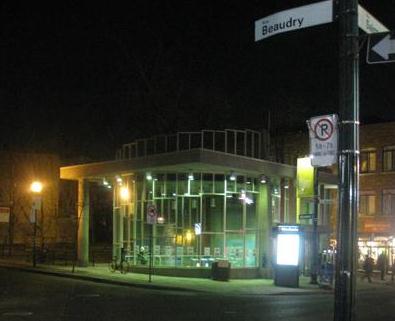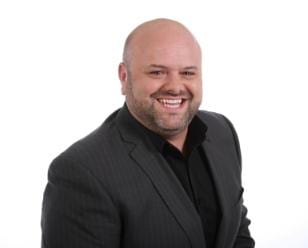
The entrance to Beaudry metro station, one of the principal gateways to Montreal's gay village. Credit: Richard Burnett
It’s a familiar refrain: “I never thought it would happen to me.”
Jean-Sébastien Boudreault, vice-president of Fierté Montréal Pride, had heard all the stories of violence happening in Montreal’s gay village over the last year or so but was still surprised to find himself a target.
“I’m a big guy. So I was stunned when this woman tackled me while two men started kicking me,” he says.
The attack happened – of all nights – immediately following Fierté Montréal’s official boys’ launch party at the Apollon nightclub on Aug 17. “I left the club around 3am and was headed back to my hotel when I heard a woman screaming,” recalls Boudreault, who soon realized the woman was not in any trouble but was, rather, a troublemaker. “I told her to quiet down before she jumped me and punched me in the right eye.”
Two men joined the melee and continued pounding Boudreault after he fell to the ground. “I was told I’d been unconscious on the sidewalk for half an hour before an ambulance brought me to Notre-Dame Hospital, where I stayed overnight, my body black and blue, with a swollen face and eye. I’ve been unable to return to Montreal’s gay village ever since.”
As first reported in Xtra last December, homophobic and violent incidents have been on the rise in Montreal’s gay village since the spring of 2011. Similar concerns were raised this summer by residents of Toronto’s gay village. Police there recently arrested 11 people after a string of attacks.
This past April Montreal activists and business owners launched the J’Aime Mon Village publicity campaign to help raise awareness and safety in the village while encouraging victims and witnesses to report all criminal acts to police. Two months later Montreal-based Gai Écoute launched its Acts of Homophobia Registry (AHR).
“Homophobic acts are being committed – but not just in Montreal’s gay village,” says Gai Écoute president Laurent McCutcheon. “And people are not reporting them [to the police] because they can’t be bothered with the time-consuming process and follow-up.”
So Gai Écoute’s AHR will compile anonymous and confidential reports and complaints for 18 months, then analyze the data and release a report in June 2014. Since the project’s June 2012 launch, McCutcheon says, the registry has received almost 200 reports.
“This autumn we will expand the registry to schools throughout Quebec, then in the healthcare sector and with the Sûreté du Québec,” McCutcheon says. “This is not just about Montreal’s gay village, but about homophobic incidents throughout Quebec.”
One thing the AHR will not be doing, however, is helping victims of criminal acts file reports with police, like Montreal’s now-defunct anti-gaybashing support service Dire Enfin la Violence (DELV) did in the 1990s. Back then DELV founder Claudine Metcalfe estimated there was an average of 100 gaybashings in Montreal each year. But then as now, no solid statistics exist, something the AHR hopes to remedy. “After we release our report in 2014 we’ll be able to propose prevention programs,” McCutcheon says.
Meanwhile, McCutcheon emphasizes that victims and witnesses should report all criminal acts to police.
“Sure the registry is important, but at the end of the day, if you’ve been attacked or you see somebody being attacked, report it to the police.”
Which is exactly what Boudreault did when he was released from the hospital on Aug18, the day before Montreal’s Pride parade.
“If you’re the victim of an attack, please file a complaint with the police,” Boudreault says. “Don’t be afraid. If we don’t fight back, if we don’t go to the police, there’s not much they can do to help us.”
If you want to file an anonymous and confidential report with Gai Écoute’s Acts of Homophobia Registry:
* Online report at homophobiaday.org/default.aspx?scheme=4223 * By email: rah@gaiecoute.org
* By telephone: 1-888-505-1010
* By standard mail: Gai Écoute, Box 1006, Station C, Montréal, H2L 4V2


 Why you can trust Xtra
Why you can trust Xtra


